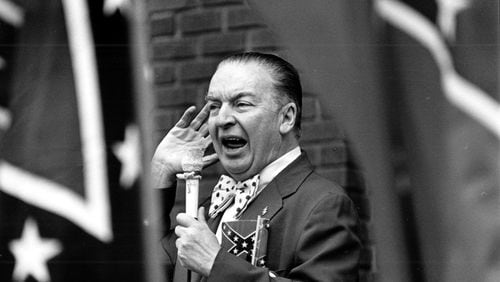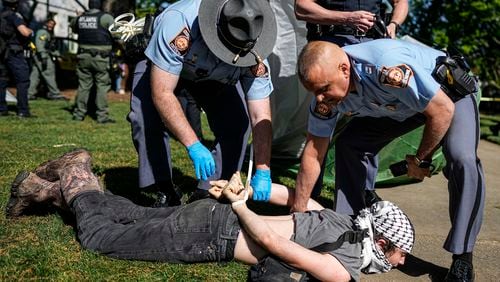The converted two-story house at 591 Cherokee St. is on the edge of what is known as Old Marietta, a 1960-ish brick addition to a line of older, more stately homes.
Upstairs is the well-appointed workspace of Dr. Michael Binns, an oral surgeon and owner of the property. He recently leased the 800 square-foot basement to the Cobb County Democratic party.
The house is only two or three traffic lights from I-75, and has excellent street exposure. The local party’s formal headquarters will remain in the nearby law office of former Gov. Roy Barnes. But larger meetings will take place at the new location, with an eye toward 2020.
“We hope that as these campaigns ramp up, presidential or Senate or whatever, this will be the first point of checking in,” said Jacquelyn Bettadapur, who chairs the county operation.
But the address is more than convenient. It is wickedly ironic.
For years, 591 Cherokee St. was one of Marietta’s most infamous addresses, home to J.B. Stoner, a notorious racist who polluted Georgia politics across four decades. He sparked a race riot in St. Augustine, Fla., in 1964, and served as an attorney appealing the conviction of Martin Luther King Jr.’s killer.
In 1980, Stoner was finally convicted for the 1958 bombing of an empty church in Birmingham. Federal prosecutors suspected him of plotting many others. Some, presumably, from that Cherokee Street address.
Last month, Cobb County Democrats held an open house to celebrate their new digs. But it wasn’t until last weekend that I contacted Bettadapur, to see if she’d meet me there Monday to discuss the house’s history.
She put me off for 24 hours. I suspect it was to make sure she had four friends in the room.
So on Tuesday, as the lunch hour approached, I sat in J.B. Stoner’s basement, one of the many places he was rumored to have hidden himself for six months after his appeals on that bombing conviction ran out.
This is a column about memory and a changing community.
I began with a simple question: You walked into this space with your eyes wide open, didn’t you?
“Not really,” Bettadapur said. “There was really no discussion about this being J.B. Stoner’s old home. It was really just available space.”
Besides, she said, it had already been test-driven last year by the state Democratic party for its 2018 operations. Some Democrats knew about the address’ history, but more didn’t.
Dr. Binns, who was part of our basement conversation and is a party member, bought the house in 2003 from another surgeon. The place had already been renovated – and Stoner’s name wasn’t mentioned until the real estate closing.
Binns remembered the name from his boyhood in Columbus. And the TV ads. In a 1972 bid for U.S. Senate, Stoner had gone to court to win the right to use the “n-word” in his TV spots. (And yes, in that and other campaigns, Stoner ran as a Democrat.)
On Tuesday, Binns spoke of an older African-American patient who had arrived for a surgery appointment — and backed out after he recognized the address.
Over the years, locals would tell of the flag with the thunderbolt that flew from the yard, a symbol of Stoner’s coat-and-tie version of the Ku Klux Klan that he helped found in the late 1950s. (An FBI report once quoted Stoner as bragging that “the name of the National States Rights Party will sound so mild that a man belonging to it will not worry about his job.”)
Binns views his new tenants as a kind of cleansing agent. “I consider this part of the rehabilitation. It’s part of the purification. It’s a testament to how far Cobb has come,” he said.
I have yet to mention the three other people in the room, and why Bettadapur might have wanted them there. One was Becky Arrington, the party’s second vice-chair and a professional “success strategist.”
Then there was the treasurer, Eileen Lichtenfeld, retired from the Weather Channel’s marketing department. And Eustacia McCloud Carter, the party secretary – a retired veteran and postal worker.
Lichtenfeld wore a necklace bearing the Star of David. She’s Jewish. Carter is African-American. J.B. Stoner’s basement was now hosting the very people he had spent his whole life hating.
Carter and Lichtenfeld had only learned about the Stoner connection the day before. They had never even heard of the fellow. And yet they had quickly warmed to the idea of occupying his former space.
Carter went to the Google machine on Monday. “I read articles about him, and thought — I love it. Evil was there, but look at what good has come out of it. All of us are representative of what he was totally against,” she said.
Lichtenfeld was of a similar opinion. Though she’d never heard of Stoner, she knew her Cobb County history, and that a Marietta crossroads was the site of the 1915 lynching of Leo Frank, a Jewish factory superintendent.
“Isn’t that karma?” Lichtenfeld asked. “It’s really rewarding to see it come around.”
Democrats are on the rise in Cobb. And it’s fair to say that the county’s surging population is a large part of that shift. There were six of us in J.B. Stoner’s basement. None of us were Cobb natives — but then again, neither was Stoner.
Yet one of the advantages of that kind of growth is that it allows us to forget that which deserves to be forgotten, bringing it out only occasionally — to remind us why it was cast aside in the first place.
Stoner served three years in federal prison for the Alabama bombing. He spent his last years in a nursing home in his native Walker County, and died in 2005, an unrepentant racist.
The first project that Cobb Democrats will launch from his old basement will be an outreach effort aimed at African-American congregations. It’s likely to have Stoner spinning in his grave, I observed.
“Spinning and burning,” Lichtenfeld added.








